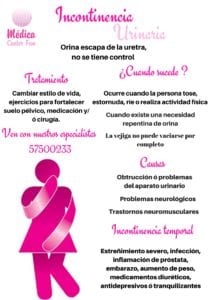Urinary incontinence
Urinary or bladder incontinence occurs when a person is unable to hold urine, which leaks out of the urethra. There are three types of incontinence , the main ones being:
- Effort: Occurs when a person coughs, sneezes, laughs or performs physical activity.
- Urgent: This is when there is a sudden need to urinate. The bladder then contracts and urine leaks out.
- Overflow: This occurs when the bladder cannot empty completely and causes post-voiding dripping.
The causes of incontinence are:
- Urinary tract obstruction
- Any changes in the female reproductive system or male reproductive system
- Neurological problems
- Mental illness or injury, such as dementia
- Problems with the urinary tract or vagina
- Neuromuscular disorders
Just as incontinence can be sudden and disappear after a short period of time, it can last for a long time. Causes of temporary incontinence include:
- Pregnancy
- Mental confusion
- An infection or inflammation of the prostate
- Weight gain
- Fecal retention due to severe constipation
- The use of diuretic medications, antidepressants, tranquilizers, among others
How to treat incontinence?
If you have symptoms of incontinence , it is necessary to visit your doctor so that he can perform the necessary tests and recommend a treatment plan.
Treatment will depend on the  origin of the problem.
origin of the problem.
Change your lifestyle : By changing your habits, you can help alleviate the problem. This involves regularizing bowel movements to avoid constipation, quitting smoking, avoiding alcohol, avoiding caffeine, losing weight , and keeping blood sugar levels low.
Bladder training: Like strengthening the pelvic floor muscles ( kegel exercises) , proper bladder training can benefit bladder strengthening.
Medications: Depending on the type of problem you have, your doctor will have to prescribe the appropriate medication.
Surgery: If the treatments have not given you results, your doctor may recommend surgery.
It is essential to go for a medical check-up if you have: Problems talking and walking, weakness, sudden tingling or numbness in the leg or arm, loss of vision, loss of bowel control, loss of consciousness or confusion.
Blood in the urine, cloudy urine, fever, pain when urinating, burning when urinating, problems starting to urinate, dribbling, frequent or urgent need to urinate.

Embarazo interrumpido
Embarazo interrumpido definición es utilizado para referir a una interrupción involuntaria o voluntaria del embarazo antes de que el feto...¿Qué es la copa menstrual?
La copa menstrual no es más que un recipiente el cual es insertado en la entrada vaginal de la mujer...
